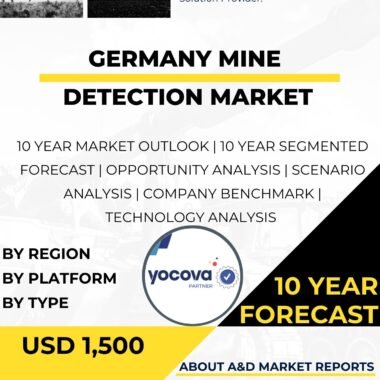Description
Overview of the Mine Detection Market in Australia
The Australia Mine Detection Market plays a vital role in ensuring the safety of both land and maritime domains. As a country with vast coastlines, extensive mining operations, and significant defense activities, Australia faces threats from both landmines and naval mines. These hazards can cause severe consequences, including civilian casualties, damage to infrastructure, and disruption of military operations. Therefore, developing and deploying advanced mine detection technologies is crucial for protecting lives, assets, and national security.
Significance of Mine Detection in Australia
The mine detection market in Australia is driven by diverse security challenges. On land, unexploded ordnance and legacy landmines from past conflicts threaten civilians and hinder infrastructure development. In remote mining regions, the risk of improvised explosive devices (IEDs) endangers workers and disrupts resource extraction. At sea, Australia’s extensive coastline and maritime territory demand robust naval mine detection capabilities. Naval mines could disrupt trade routes, damage vessels, and undermine maritime defense. Thus, mine detection remains a strategic priority for both civilian and defense sectors.
Key Technologies in the Mine Detection Market
The mine detection market in Australia incorporates several advanced technologies for identifying and neutralizing threats.
Land-Based Technologies
Ground-penetrating radar (GPR) is a primary tool for detecting buried landmines. It emits electromagnetic waves and analyzes reflections to map potential minefields. GPR is widely used in humanitarian demining and post-conflict clearance operations.
Metal detectors remain essential for detecting metal-cased landmines and explosive remnants of war. These devices are vital for clearance teams working in both civilian and military environments.
Recent advancements have introduced AI-powered algorithms that process data from multiple sensors, including GPR, metal detectors, and multispectral imaging. Artificial intelligence enhances detection accuracy, minimizes false alarms, and accelerates demining operations.
Maritime Technologies
In the maritime sector, sonar systems play a crucial role. High-resolution sonar detects and identifies naval mines on the seabed or within the water column. Autonomous underwater vehicles (AUVs) equipped with sonar are now key assets for mine detection and underwater surveillance missions.
Major Players in the Australia Mine Detection Market
Several companies, both domestic and international, contribute to the mine detection market in Australia. Local defense firms such as Thales Australia and Austal provide advanced sensor and autonomous solutions for defense applications. International companies like Lockheed Martin, BAE Systems, and Saab collaborate with Australian partners to enhance national mine detection capabilities through technology transfer and innovation.
Applications of Mine Detection Technologies
Mine detection technologies have multiple applications across various sectors in Australia.
-
Humanitarian Efforts: Support landmine clearance and help restore conflict-affected areas, enabling safe resettlement and infrastructure development.
-
Mining Industry: Ensure the safety of workers and equipment by detecting explosive threats in mining zones.
-
Defense Operations: Support the Australian Defence Force (ADF) in land and maritime missions, ensuring troop safety and protecting naval assets from mine threats.
Future Outlook of the Mine Detection Market in Australia
The future of the mine detection market in Australia is promising, driven by technological innovation and increased defense investments. The integration of AI and machine learning will further enhance accuracy and speed. Unmanned systems such as drones and AUVs will take on more complex detection roles, minimizing risks to human operators. Collaboration between Australian defense firms and international partners will continue to foster innovation and strengthen Australia’s leadership in mine detection technology.
Conclusion
The mine detection market in Australia is essential for national security, humanitarian efforts, and industrial safety. Advanced technologies like ground-penetrating radar, metal detectors, sonar systems, and AI-driven platforms form the backbone of this sector. Supported by leading domestic and international defense companies, Australia is well-positioned to advance its mine detection capabilities, ensuring a safer and more secure environment for the future.




